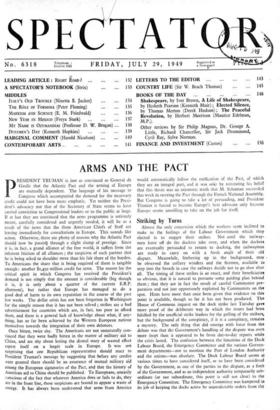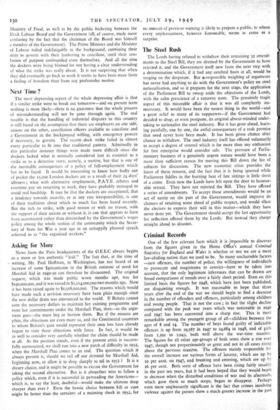Striking by Turns
Almost the only concession which the workers seem inclined to make to the feelings of the Labour Government which they
elected is to stagger their strikes. Not until the railway- men leave off do the dockers take over, and when the dockers are eventually persuaded to return to docking, the railwaymen are ready to carry on with a fresh angle of their old dispute. Meanwhile, limbering up in the background, may be observed the colliery winders and the firemen, available to step into the breach in case the railways decide not to go slow after all. The timing of these strikes is so exact, and their beneficiaries so obvious, that it is natural to presume some guiding plan behind them ; that they are in fact the result of careful Communist pre- paration and not just opportunely exploited by Communists on the spot. Hints have more than once been given that evidence on this point is available, though so far it has not been produced. The House of Commons inquest on the dock strike last Tuesday gave more proof of the deliberate way in which the issues had been falsified by the unofficial strike leaders for the gulling of the strikers, but the background of the conspiracy, if it is a conspiracy, remains a mystery. The only thing that did emerge with force from the debate was that th: Government's handling of the dispute was even more inept than it appeared to be from day-to-day reports while the crisis lasted. The confusion between the functions of the Dock Labour Board, the Emergency Committee and the various Govern- ment departments—not to mention the Port of London Authority and the unions—was absolute. The Dock Labour Board seems at various times to have considered itself, or to have been considered by the Government, as one of the parties to the dispute, as a limb of the Government, and as an independent authority temporarily sub- ordinate (or not subordinate, this point is still not clear) to the Emergency Committee. The Emergency Committee was hampered in its job of keeping the docks active by unpredictable orders from the
Ministry of Food, as well as by the public bickering between the Dock Labour Board and the Government (all, of course, made more confusing by the fact that the chairman of the Board was himself a member of the Government). The Prime Minister and the Minister of Labour toiled indefatigably in the background, entwining their duty to govern with their hankering to conciliate, until their con- fusion of purpose confounded even themselves. And all the time the dockers were being blamed for not having a clear understanding of what the strike was really about. It is not surprising that when they did eventually go back to work it seems to have been more from a feeling of boredom than from any profounder motive.



































